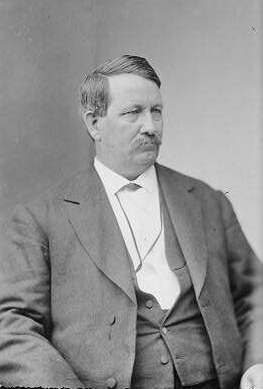Jordan E. Cravens facts for kids
Quick facts for kids
Jordan Edgar Cravens
|
|
|---|---|
 |
|
| Member of the U.S. House of Representatives from Arkansas's 3rd district |
|
| In office March 4, 1877 – March 3, 1883 |
|
| Preceded by | William W. Wilshire |
| Succeeded by | John H. Rogers |
| Personal details | |
| Born | November 7, 1830 Fredericktown, Missouri |
| Died | April 8, 1914 (aged 83) Fort Smith, Arkansas |
| Political party | Independent Democrat Democratic |
| Spouse | Emma Batson Cravens |
| Military service | |
| Allegiance | |
| Branch/service | |
| Years of service | 1861 to 1865 |
| Rank | |
| Unit | |
| Battles/wars | Civil War |
Jordan Edgar Cravens (born November 7, 1830 – died April 8, 1914) was an American politician. He served as a U.S. Representative for Arkansas. He was also a cousin to another politician, William Ben Cravens.
Contents
Early Life and Education
Jordan Edgar Cravens was born in Fredericktown, Missouri. When he was just one year old, his family moved to Arkansas. He went to local schools there. In 1850, he graduated from the Cane Hill Academy in Boonsboro, which is now known as Canehill.
Becoming a Lawyer
After finishing school, Jordan Cravens decided to study law. He worked hard and was allowed to practice law in 1854. This means he passed the tests needed to become a lawyer. He started his law practice in Clarksville, Arkansas.
Family Life
In 1860, Jordan Cravens became a member of the State House of Representatives. He married Emma Batson, and they had five children together: Jeane, Jane, Felix, Sallie, and Samuella. Emma's father, Felix Ives Batson, was also an important figure. He was an Arkansas Supreme Court judge and served in the Confederate Congress during the Civil War.
Career Highlights
Jordan Cravens had a varied career, serving both in the military and in politics.
Military Service
In 1861, Cravens joined the Confederate States Army as a private. He quickly rose through the ranks. By May 1862, he was elected Colonel of the 21st Arkansas Infantry Regiment. His unit was part of the forces that surrendered at Vicksburg, Mississippi, in July 1863. Later, his unit combined with others to form the 1st Arkansas Consolidated Infantry Regiment (Trans-Mississippi). He continued to serve as a colonel in this new group.
Political Roles
After the American Civil War ended, Cravens returned to Clarksville. He became the prosecuting attorney for Johnson County from 1865 to 1866. Then, he served as a member of the Arkansas State Senate from 1866 to 1868.
Serving in Congress
Jordan Cravens was elected to the Forty-fifth Congress as an Independent Democrat. He was then reelected as a Democrat to the Forty-sixth and Forty-seventh Congresses. He served in the U.S. House of Representatives from March 4, 1877, to March 3, 1883. After his time in Congress, he went back to practicing law in Clarksville. He also served as a circuit court judge from 1890 to 1894.
Later Life and Passing
Jordan Edgar Cravens passed away in Fort Smith, Arkansas on April 8, 1914, at the age of 83. He was buried at Oakland Cemetery in Clarksville, Arkansas.
 | Anna J. Cooper |
 | Mary McLeod Bethune |
 | Lillie Mae Bradford |

